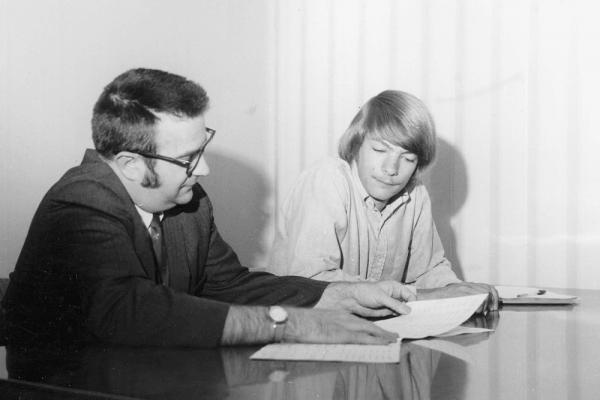Duane Shank, a Mennonite peace activist, community organizer, and author, died on April 20 in Goshen, Ind., after two years in hospice. He was 70. The cause was complications from chronic obstructive pulmonary disease, according to his family.
On his 18th birthday in January 1970, at the height of the Vietnam War, Duane Shank, a Mennonite from central Pennsylvania, mailed a letter to the United States government explaining why he would not register for the draft.
“As a member of a so-called ‘Peace Church,’” Shank wrote to the Selective Service Administration, “I could easily apply for and receive a classification as a conscientious objector. But, this would be, in effect, an acceptance of the system of conscription and the militarism for which it stands, and would also be a way of effectively silencing my conscience … The action I am taking shows my own refusal to participate in war, but even more, my belief that no man should be forced into war.”
Shank was influenced by his growing awareness of racism and classism in the late 1960s and the vast overrepresentation of poor men and Black and brown men in the selection process. He was shocked at the assassinations of Martin Luther King Jr. and Robert F. Kennedy, whom he admired. He grew increasingly uncomfortable about the way some Mennonites applied for conscientious objector status without taking a stronger stand against war, writing in his letter that to “accept any classification from the Selective Service would be to recognize the legitimacy of the System, a legitimacy that does not exist.”
Historian Donald Kraybill, in his book Eastern Mennonite University: A Century of Counterculture, recounts how FBI agents surprised Shank in his dorm at then-Eastern Mennonite College. The agents verified Shank’s identity and opposition to registering for the draft and then left, according to Kraybill.
“About a month later, as Shank was taking an exam in the chapel, a teacher tapped him on the arm and whispered that someone wanted to speak with him at the back. Leaving his books on his seat, Shank walked to the vestibule, where two FBI agents met him,” Kraybill wrote. “They drove him 30 miles south to Waynesboro because the Harrisonburg jail lacked adequate security for federal prisoners. Within hours, EMC’s dean of men, Jerry Shenk, cobbled together $500 for Shank's bail, drove to Waynesboro, and returned him to campus.”
Shank went through months of hearings and trials until he was sentenced to three years of community service, according to authors Melissa Miller and Phil M. Shenk in their book The Path of Most Resistance. Some Mennonite men were not as lucky as Shank; Dennis Koehn, who attended Bethel College at the time of his arrest in 1970, was sentenced to “an indefinite length of time [in prison that would] not exceed six years.” Koehn served 18 months in federal prison.
“Conscription was part of the war system,” Shank said at a panel held at Goshen College in 2009. “For me, if I didn't want to participate in war, I also had to not cooperate with the draft. It wasn't just about staying personally pure, but also about being a Christian witness to the state of being opposed to war in entirety.”
Between 1964 and 1973 the Selective Service reported nearly 200,000 draft violators to the Justice Department and nearly 1 million men refused induction or failed to register. More than 50 Mennonites refused to cooperate with the Vietnam War draft, according to Miller and Shenk.
On the 50th anniversary of Shank’s stand against the draft, he emphasized that his actions at 18 had been the beginning of his career and witness for peace.
Early experiences
Duane Shank was born in Chambersburg, Pa., in Franklin County, and raised in Lancaster County, Pa., a hub for Mennonite immigrants in the 1700s who settled there as part of William Penn's “holy experiment” of religious tolerance. He was the grandson of Anna Martin and Harvey Eshleman Shank. Harvey served as pastor to the rural mission Pond Bank Mennonite Church from 1921 to 1946 and as bishop of the South Franklin County (PA) Mennonite churches from 1946 to 1971, including following the 1965 division of the regional Mennonite conference over issues of progressive values and accommodation to the secular world.
Duane was the son of Anna Elizabeth Metzler Shank, a nurse, and Luke J. Shank, a chemistry teacher and pastor. Luke was ordained as a minister in the Mennonite Church in 1946 and served at several local Mennonite churches, including Pond Bank Mennonite church, where his father had previously served. He was author of “Our boys in Civilian Public Service of the Washington Co., Md.-Franklin Co., Pa. Conference” detailing the local experience of conscientious objectors during World War II in CPS, a program funded and administered entirely by the churches in the Mennonite, Brethren, and Quaker traditions.
Duane Shank’s early experiences shaped his life and career. As part of his community service, he was a community organizer with the Virginia Community Development Organization, worked as a counselor for conscientious objectors, and as an anti-war organizer during the Vietnam War, including with the Center on Conscience and War (formerly the National Inter-religious Service Board for Conscientious Objectors) in Washington, D.C.
Resisting nukes and drones
In the 1980s, Shank worked as an organizer in interfaith coalitions, helped build the nuclear weapons freeze movement, and was active in the Central American peace campaigns and efforts to cut U.S. support for wars in El Salvador and Nicaragua. He worked with the National Committee for a SANE Nuclear Policy with executive director David Cortright and assisted with its 1987 merger with the grassroots-based Nuclear Weapons Freeze Campaign, led by arms control expert Randall Caroline Forsberg. Shank served as SANE/Freeze’s deputy director and acting executive director.
In the early 1990s, Shank was a research fellow at the Institute for Policy Studies, where he worked closely with historian and political economist Gar Alperovitz, author of The Decision to Use the Atomic Bomb and the Architecture of an American Myth, to which Shank contributed.
From 1995 until his retirement in 2014, Shank served in a variety of leadership positions at Sojourners, including as senior policy advisor; outreach director for Call to Renewal; an organizer of the Circle of Protection (a coalition of church bodies across the theological spectrum that pays special attention to national legislation on poverty and the most vulnerable); producer of a daily justice news segment for the God’s Politics blog; and lead researcher for Sojourners’ daily “Drone Watch” to track U.S. military drone strikes and victims around the world. Shank was the lead organizer for the Sojourners presidential candidate forum in 2006, which included then-Sen. Barack Obama. In addition, Shank was a key contributor, researcher, and copy editor for several books by Sojourners co-founder and former president Jim Wallis, including The New York Times bestseller God’s Politics. Shank was known among his colleagues as a gifted strategist and skilled coalition builder, with a knack for administration.
Mennonite scholarship
Shank was a highly respected peace scholar among Mennonites, noted for his reflections on John Howard Yoder, two-kingdoms theology, and the history of the relations between Mennonites and the state. With Philip Wheaton, Shank was co-author of Empire and the Word: Prophetic Parallels between the Exilic Experience and Central America's Crisis (EPICA, 1988), a work often cited by Old Testament scholars. In addition, he wrote hundreds of articles for Sojourners and other publications addressing issues of justice, war, peace, and occasional music reviews.
“It is important once again to call the church to be a peace church,” Shank said at a Goshen College event in 2009. “A Christian peace witness is a Mennonite gift to the wider church. If we lose that, the entire church is hurt.” From this flowed his wonderful gift of worship leadership at Community of Christ ecumenical community in the Mount Pleasant neighborhood of Washington, D.C., where he was an active member for more than 30 years, as well as at Sojourners, where he also served as a worship leader. Since 2015, he was a member of Assembly Mennonite Church in Goshen, Ind.
Shank is survived by his wife Ellen Kennel and his daughter Celeste Grace Kennel-Shank and son-in-law Josiah Groff; two sisters Calliope Shank (Deborah Fort) and Debbie (Terry) Shank Miller and a brother, Dan (Louise) Shank.
In the obituary he wrote for himself, published by Goshen News, Shank asked to be remembered as “a man of integrity and humility who was known for his gentle thoughtfulness, steadying calmness and principled commitment to peacemaking. He was a good listener and enjoyed mentoring young people, who saw in him a gentle spirit and bold faith.”
Longtime friend and colleague David Cortright, director of the Global Policy Initiative of the Keough School of Global Affairs at the University of Notre Dame, said Shank “was a humble person content with serving in a supportive role rather than in the limelight, but he made everything possible with his indefatigable work ethic and his willingness to do whatever was necessary to advance the cause of justice and peace.
“Duane’s shoulders carried whole movements for justice and most never knew.”
Shank died at home not long after watching the Washington Nationals beat the Arizona Diamondbacks. Friends said they can hear Shank echoing a comment made that night by Nats’ pitcher Josiah Grey: “Never really want the ball taken from me,” he said, “but I understand the situation.”
Got something to say about what you're reading? We value your feedback!






